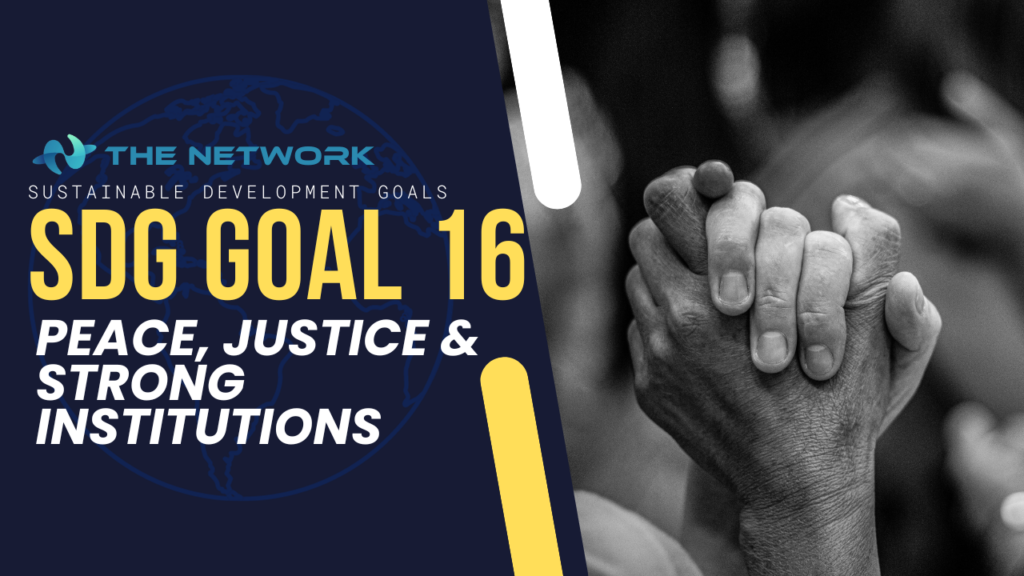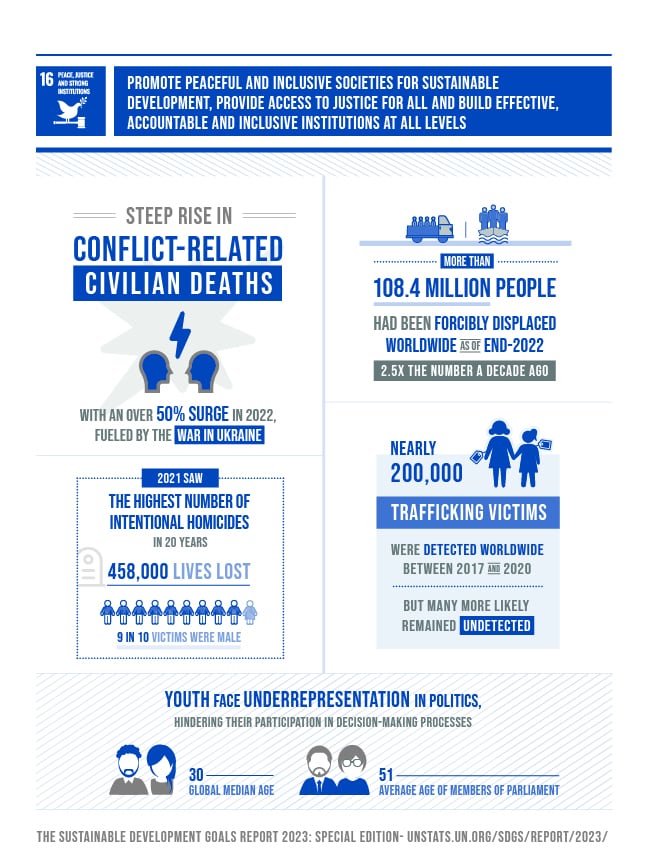Sustainable Development Goal 16 – Peace, Justice & Strong Institutions

In an era where conflicts, injustice, and weak governance structures continue to plague various parts of the world, understanding and working towards Sustainable Development Goal 16 (SDG 16) becomes imperative. This goal, part of the 17 Sustainable Development Goals established by the United Nations in 2015, focuses on promoting peace, justice, and building strong institutions. It recognizes the fundamental role these elements play in achieving a sustainable and prosperous society.
The Essence of Peace and Justice in Society
At the core of a thriving society lies the notion of peace and justice. These aren’t just lofty ideals but tangible prerequisites for any community’s progress. Peace allows for the uninterrupted pursuit of personal and collective goals, while justice ensures fairness and equality, breeding a sense of trust and security among citizens. A society underpinned by these values fosters cooperation, encourages diversity, and nurtures development in all spheres.
Reducing Violence and War
The goal of diminishing violence and war globally is a challenging yet vital objective. It involves addressing root causes like poverty, inequality, and lack of education. Strategies include promoting conflict resolution and peacebuilding efforts, investing in education and economic opportunities, and ensuring robust legal frameworks that deter war crimes and human rights violations.
Ending Abuse and Violence Against Children
Children are often the most vulnerable in any society. Protecting them from exploitation, trafficking, violence, and torture is crucial for their development and the wellbeing of society as a whole. This requires a multifaceted approach, including strengthening child protection laws, creating safe and supportive environments, and raising public awareness about children’s rights and the harms they face.
Promoting Rule of Law and Equal Justice
The rule of law is the bedrock of a fair society. Ensuring its application at both national and international levels is essential for guaranteeing equal justice for all. This involves reforming judicial systems to be more accessible and unbiased, training legal professionals in human rights law, and enhancing public understanding of legal rights and processes.
Tackling Corruption and Bribery
Corruption and bribery undermine justice and the integrity of institutions. They create unequal opportunities, erode public trust, and hamper development. Addressing these challenges involves implementing strict anti-corruption laws, promoting transparency and accountability in governance, and fostering a culture of integrity within societies.
Developing Accountable and Transparent Institutions
Strong institutions are the backbone of a stable and just society. Developing effective, accountable, and transparent institutions at all levels is crucial. This can be achieved through good governance practices, ensuring public access to information, and enabling citizen participation in decision-making processes.
Strengthening Institutions to Prevent Violence and Crime
World governments and organizations can play a significant role in strengthening national institutions to prevent violence and combat crime and terrorism. This involves international cooperation for capacity building, especially in developing countries, and adopting comprehensive strategies that address the socio-economic factors contributing to crime and violence.
School or Homeschool Learning Ideas
- Conflict Resolution Simulation – Conduct a conflict resolution simulation where students role-play as mediators, negotiators, and stakeholders in resolving a fictional conflict scenario. Use real-world examples like peace negotiations in conflict zones such as the Middle East or the Korean Peninsula to illustrate the complexities of achieving peace and justice. Through this simulation, students will learn about the importance of diplomacy, negotiation, and conflict resolution skills in building strong institutions and promoting peace.
- Human Rights Case Study – Analyze real-world human rights case studies to understand the role of justice institutions in upholding human rights and promoting social justice. Use examples like landmark court cases or human rights investigations to illustrate the challenges and successes in protecting human rights. Students will explore issues like access to justice, rule of law, and accountability in addressing human rights violations.
- Civic Engagement Project – Engage students in a civic engagement project focused on promoting transparency, accountability, and participation in governance. Use real-world examples like grassroots movements for democracy or anti-corruption campaigns to inspire students in advocating for social and political change. Through this project, students will learn about the importance of civic participation in strengthening institutions and promoting peace and justice.
- Rule of Law Debate – Facilitate a debate or discussion on the importance of the rule of law in ensuring justice and stability in society. Use real-world examples like the impact of corruption on governance or the role of international law in addressing human rights violations to explore the principles of the rule of law. Students will analyze the significance of legal frameworks, judicial independence, and accountability mechanisms in building strong and just institutions.
- Community Service Initiative – Encourage students to participate in community service initiatives aimed at promoting peace, justice, and strong institutions locally. Use real-world examples like legal aid clinics, youth advocacy groups, or community policing programs to inspire students in contributing to social change. Through their involvement in community service, students will develop leadership skills, empathy, and a sense of responsibility in fostering peace and justice in their communities.
What Our Children Need to Know
- Understanding Peace and Justice: Children should be taught the importance of peace and justice in society and how they contribute to the well-being of all.
- Role of Law and Governance: Introducing concepts of law, governance, and their role in maintaining order and fairness.
- Responsibility Towards Society: Encouraging children to think about their role in promoting a peaceful and just society.
- Recognizing and Combating Injustice: Teaching children to identify forms of injustice and ways to combat them, including standing against bullying and discrimination.
The Big Questions
- How does peace in our community contribute to global peace?
- What are the consequences of ignoring justice in society?
- How can each individual contribute to reducing violence and promoting justice?
- What role do institutions play in maintaining peace and justice?
- How does corruption impact everyday life and societal development?






Responses